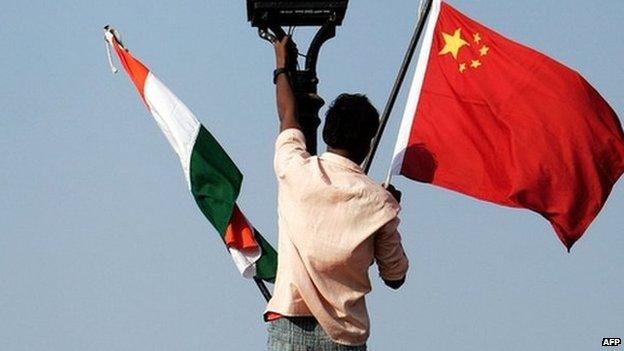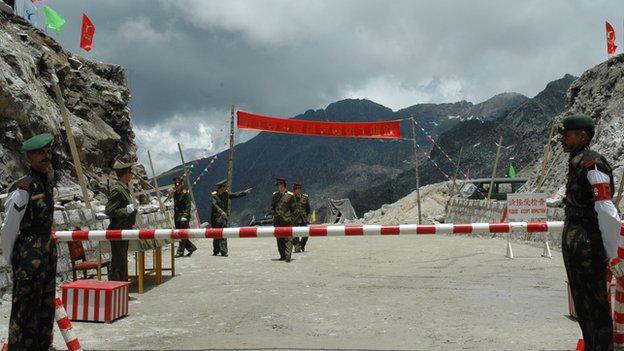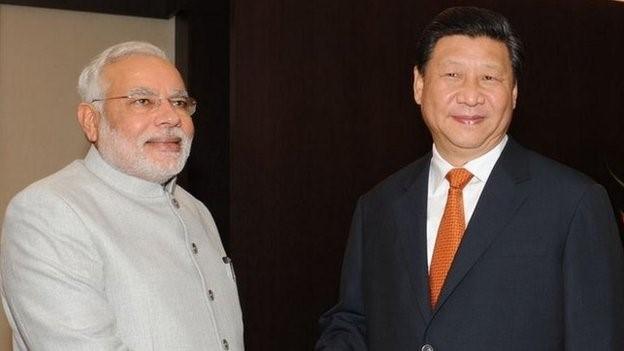Why Xi Jinping's visit to India is significant
- Published

China is one of India's top trading partners
This is an interesting month in India's diplomatic diary.
After a successful visit to Japan earlier this month, Prime Minister Narendra Modi will be welcoming Chinese President Xi Jinping on Wednesday.
He will be following this up with his visit to the US at the end of September. And it is being claimed that both Mr Xi's visit to India and Mr Modi's visit to Washington will pack quite a punch.
Given the recent history of turbulence in Sino-Indian ties, the visit of the Chinese president to India will be closely watched and analysed.
As chief minister of Gujarat, Mr Modi travelled to China five times, more than to any other nation, and he has been visibly impressed by China's economic success.
His landslide electoral victory in May was viewed by some in Beijing as a harbinger of better times, with Mr Modi being described as India's "Nixon" who will take Sino-Indian ties to new heights.
Personal rapport
This early exuberance has now given way to a more realistic appraisal but Beijing views Mr Modi as a strong leader who can deliver.
An early outreach to Mr Modi was, therefore, seen as essential in making sure that Delhi does not gravitate rapidly to an emerging anti-China coalition in the larger Indo-Pacific as the US fashions its strategic rebalance to the region.
Mr Xi will start his visit from Modi's home state of Gujarat on Mr Modi's 64th birthday on Wednesday where he will be personally welcomed by the Indian prime minister and treated to a sumptuous traditional dinner on the banks of the Sabarmati river.
Mr Modi and Mr Xi have already met previously at the Brics summit in Brazil where they were able to develop a personal rapport which they would like to use to make this visit a success.
Much like Mr Modi, Mr Xi is also a strong nationalist leader who has a hardline orientation on national security but remains eager to co-operate on economic issues.
Mr Modi's room for diplomatic manoeuvering is considerably higher than that of his predecessor, Manmohan Singh, who was constrained by his lack of political authority and his party's seeming foreign policy ineptitude.

China and India fought a brief war over their disputed Himalayan borders in 1962
Where the Congress Party has been paralysed by an almost irrational fear of offending Chinese sensitivities and in the process ended up jeopardising Delhi's ties with its partners like Japan and the US, Mr Modi has taken a more confident position from the very time he assumed office.
Where he has openly talked of Chinese "expansionism" and has started taking concrete measures to insulate India from the negative effects of China's rapid military modernisation, he has also made it clear that he would be going all out to woo Chinese investments into India.
Mr Modi's energetic diplomacy in his first few months in office seems to have put China on notice that Delhi is not without options in a rapidly evolving global geostrategic context.
It has increased India's strategic space which Mr Modi would now like to leverage in his engagement with Beijing.
In a sign that the focus of Mr Xi's visit will be on energising trade ties, the Chinese president will be accompanied by more than 100 Chinese businesspeople.
China is likely to announce several major investment initiatives in India as the Chinese corporate sector starts looking at India with renewed interest under Mr Modi.
India has been averse to Chinese participation in many sectors of the economy, thereby reducing the flow of Chinese foreign direct investment into India despite its dire need for it.
Chinese companies will now be encouraged to invest in India by unveiling dedicated industrial parks in India.
China is India's largest trading partner but with an increasing trade deficit hovering around $40bn. This is something that Mr Modi remains focused on rectifying.
This focus on trade and economic issues does not mean that Mr Modi's government can afford to soft pedal on strategic issues.
'Maritime silk road'
Last week, India's Foreign Minister, Sushma Swaraj, made it clear China must respect India's territorial claim over Arunachal Pradesh.
"For India to agree to a one-China policy, China should reaffirm one-India policy," argued Ms Swaraj.
The Sino-Indian relationship faces a number of challenges - from the vexed boundary issue to a growing trade imbalance.
Public perceptions have turned negative as mutual distrust between China and India has grown in the last few years.
According to the Indian Home Ministry, there have been 334 "transgressions" by Chinese troops over the Indian border in the first 216 days of this year.
China's growing naval presence in the Indian Ocean poses its own challenge to India.

Mr Modi and Mr Xi met at the Brics summit in Brazil
Mr Xi's visit to Maldives and Sri Lanka before coming to India underscores Beijing's commitment to develop close links with the island states of the Indian Ocean.
China's plans for a "maritime silk road, external" connected by cross-border infrastructure will further cement Beijing's role in the region as both Male and Colombo have lapped up China's invitation to join this initiative.
India has been invited too but it remains ambivalent about the project and is yet to make up its mind.
The challenges are immense but so is this opportunity which is presented by the emergence of strong political leaderships in Beijing and Delhi.
Both Mr Modi and Mr Xi have recognised this. It remains to be seen if they will be able to grasp the nettle this week.
Harsh V Pant is Professor of International Relations at King's College, London.
- Published13 December 2011
- Published11 April 2011